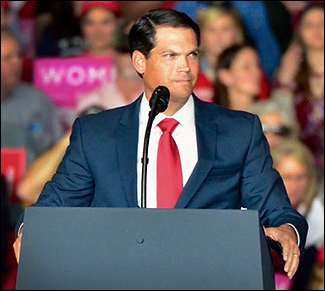By Jim Ellis — Tuesday, March 19, 2024
Senate
Ohio: Primary Today — A hard-fought Republican US Senate primary draws to a close tonight. The contest is a three-way race among state Sen. Matt Dolan (R-Chagrin Falls), Secretary of State Frank LaRose, and businessman Bernie Moreno.Polling has shown a close race for months. In the closing week, the polling lead has changed hands between Sen. Dolan and Moreno. Moreno man has former President Donald Trump and US Sen. J.D. Vance’s (R-OH) endorsements. Gov. Mike DeWine (R) supports Sen. Dolan. Both Moreno and Dolan have loaned millions of their own personal fortunes into their respective campaigns. Secretary LaRose, the only previously elected statewide official, appears to have fallen well back and consistently into third place.
Whatever tonight’s final result, the winner will head into what promises to be a tight and bruising campaign against three-term Sen. Sherrod Brown (D) in one of the nation’s most important 2024 Senate races.
House
CA-20: Special Election Today — Despite California’s 20th District voters choosing general election finalists on March 5, they go back to the polls today to potentially select an immediate successor to resigned House Speaker Kevin McCarthy (R). If no candidate receives majority support in today’s vote, the top two finalists will advance to a May 21 special general election. At that point, the winner will take the seat.
Chances are strong that Assemblyman Vince Fong (R-Bakersfield) and Tulare County Sheriff Mike Bourdeaux (R), both of whom have secured regular general election ballot positions for November, will also advance tonight. The field is somewhat different than what was present for the regular election, but the major participants return. The reason this special vote was not made concurrent with the March 5 election is that California law stipulates a specific number of days must elapse between the occurrence of an official vacancy and the subsequent replacement election.
Illinois: House Races Dominate — With no Senate or governor’s election on the Illinois ballot this year, the most interesting elections tonight, now that both parties have presumptive presidential nominees, are for the US House. Several members face primary challenges, but all incumbents are favored to win renomination.
For the Democrats, Reps. Jesus “Chuy” Garcia (D-Chicago), Danny Davis (D-Chicago), and Bill Foster (D-Naperville) face opponents with either campaign resources or a political base. Chicago Alderman Ray Lopez, who ran unsuccessfully for Congress and mayor, opposes Rep. Garcia who also lost the 2023 mayor’s race. Rep. Davis received only 52 percent in the 2022 Democratic primary and faces four relatively strong candidates. The large number of challengers and the plurality format certainly favors Rep. Davis since his opposition vote will be split among four contenders. Rep. Foster is facing a well-financed effort from human rights activist Qasim Rashid, but his previous electoral experience has come in Virginia. Therefore, expect Rep. Foster to record a comfortable win tonight.
The top Republican primary comes in southern Illinois where five-term Rep. Mike Bost (R-Murphysboro) defends his seat against the 2022 Republican gubernatorial nominee and former state Sen. Darren Bailey. Though the congressman has a major financial advantage, the only recent publicly released poll found only a single-digit support difference between the two men.
Ohio: Key House Races Also on Ballot — The top House attraction this evening is in the vacant 6th Congressional District where state Sen. Michael Rulli (R-Salem) and state Rep. Reggie Stoltzfus (R-Delaware) battle to replace resigned Rep. Bill Johnson (R). Since this is a partisan special election, the winner advances to a June 11 general election. After the subsequent winner is chosen, the individual will immediately take the seat to fill the balance of the current term.
Highly competitive crowded battles are underway in the open 2nd District from which Rep. Brad Wenstrup (R-Hillsboro) is retiring. Tonight’s Republican primary winner will be a lock to claim the seat in November. The other major primary occurs in the Toledo anchored 9th District where Republican state Rep. Derek Merrin (R-Monclova) and former state Rep. Craig Reidel are battling for the nomination after 2022 nominee J.R. Majewski dropped out of the race. The winner faces 21-term incumbent Marcy Kaptur (D-Toledo) in the general election.





